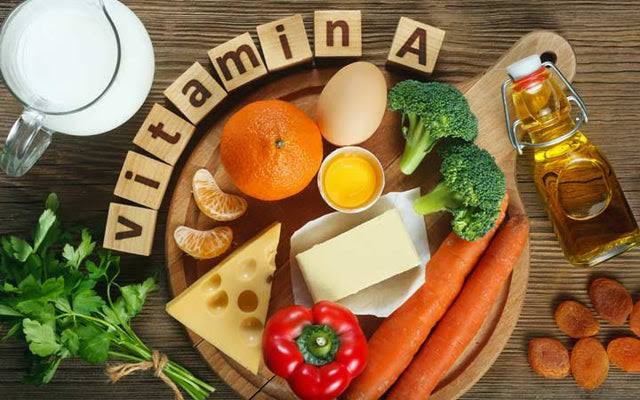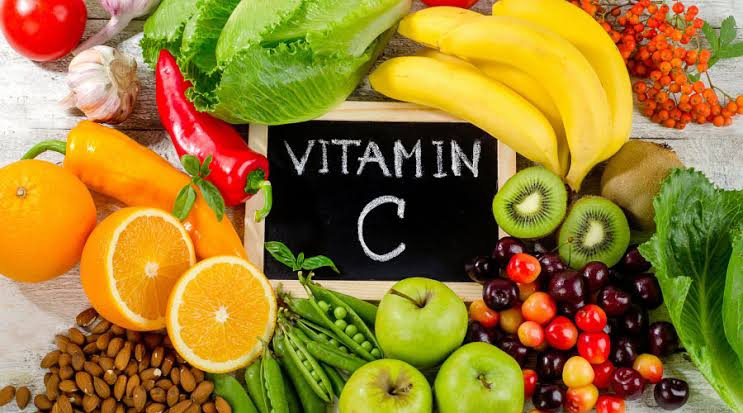Vitamins
Functions of Vitamins
- Essential for growth and development
- Improves heart, skin, and brain health
- Energy production and metabolism
- Boosts immunity
- Performs specific bodily functions
Classification of Vitamins
- Fat soluble vitamins: It includes Vitamin A,D,E & K
- Water soluble vitamins: It includes Vitamin B complex & C
Vitamin A
We get Vitamin A from foods in two forms:
- Retinol, form of the vitamin that the body uses, present mostly in animal foods.
- Beta carotene, precursor of retinol, or vitamin A. This is used by the body after being transformed into retinol, or vitamin A, present in plant foods.
Functions :-
- Improves eye health
- Boosts immune function
- Leads to healthy growth
Sources :-
Foods high in retinol, or vitamin A, include butter, milk, ghee, curd, and eggs. Rich sources of vitamin A include liver and fish liver oils. Green leafy vegetables such as spinach, methi, radish leaves, and broccoli contain beta-carotene. It can also be found in red and yellow fruits like papayas and mangoes, as well as vegetables like tomatoes, pumpkin, and carrots. Together with vitamin R, milk, eggs, and butter also contain some carotene.
Vitamin D
The primary source of vitamin D for humans is 7-dehydro cholesterol, which is found beneath the skin. This precursor is transformed into vitamin D when it comes into contact with the skin. Additionally, we get it in little amounts from certain foods.
Functions :-
- Regulate calcium absorption
- Boosts immune function
- Enhances mental well-being
Sources :-
To get the majority of the vitamin D we require, sunshine that acts as the precursor, found in our skin. Additionally, foods like liver, fish, eggs, yolks, milk, butter, and ghee provide us with this vitamin. Fish liver oils are an excellent way to obtain this vitamin. Vanaspati also contains vitamin D in addition to vitamin A.
Vitamin E
This is also a fat soluble vitamin. It is important in the healthy functioning of the reproductive system in the body. It contain as group of 8 compounds with antioxidant effects. They are better absorbed with fat and can be stored in fat tissue.
Functions :-
- Act as antioxidant
- Cell membrane integrity
- Neurological functioning
Sources :-
Sunflower seeds, almonds, canola oil, wheat gram oil, red palm oil, soya bean, peanuts and coconuts.
Vitamin K
It is of two types:
- Vitamin K1 - Found in plant foods
- Vitamin K2 - Found in fermented foods, animal products and products of gut bacteria.
A little amount of vitamin K is synthesised in our body by some microorganisms present in our intestines.
Functions :-
- Blood clotting
- Calcium metabolism
- Heart health
Sources :-
Green leafy vegetables (turnip, kale, spinach, broccoli, etc.), grass fed dairy and animal products, liver, and radish.
Vitamin B
These are a set of vitamins found in some food varieties. Since they dissolve in water, it is simple to lose them simply discarding the water used to soak or boil food. There are total 8 vitamins in this group:
- Vitamin B1 (Thiamine)
- Vitamin B2 (Riboflavin)
- Vitamin B3 (Niacin)
- Vitamin B5 (Pantothenic acid)
- Vitamin B6 (Pyridoxine)
- Vitamin B7 (Biotin)
- Vitamin B9 (Folate)
- Vitamin B12 (Cobalamin)
It's cofactors are - Choline (B4), Inositol (B8), PABA (B10), Betaine
Functions :-
- Energy production
- Cognitive health
- Metabolism
- Formation of the red blood cells in our body
- Improves skin health
Sources :-
Niacin and thiamine can be found in whole grains, pulses, and nuts. These vitamins can also be found in fermented and sprouted foods like idli, dosa, and sprouted pulses. Animal products such as eggs, liver, kidney, and brain are excellent providers of the B-complex vitamins. For riboflavin, milk and its byproducts are particularly crucial. Green leafy vegetables like methi, spinach and bathua are a good source of riboflavin and folic acid.
Vitamin C
Another name for it is ascorbic acid. It swiftly deteriorates when exposed to light and heat. It mostly comes from fruits and vegetables for us. We need to get them from foods.
Functions :-
- Immune function
- Skin health and wound healing
- Adrenal health
- Healthy development of our teeth and gums
Sources :-
Many refer to vitamin C as the vitamin of fresh food. The reason for this is because cooking quickly ruins it. Vitamin C is abundant in citrus fruits, such as lemons, oranges, and sweet limes. Vitamin C-rich foods include pineapple, guava, and sprouted grains. Green leafy vegetables like spinach, methi, radish leaves, amaranth, and cholae, as well as veggies like tomatoes, green chilies, and cabbage, are also excellent sources. Amla is an inexpensive, very nutritious source of vitamin C. Strawberries and bell peppers are also good sources of vitamin C.










Comments
Post a Comment